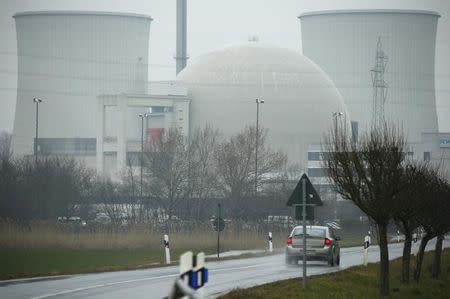Preview: Legal or not? German utilities await landmark nuclear exit ruling

By Christoph Steitz and Tom Käckenhoff FRANKFURT/DUESSELDORF (Reuters) - Germany's highest court will rule next week on whether the country's decision to exit nuclear power was legal, helping to determine whether or not three power firms can pursue damage claims of up to 19 billion euros ($20.16 billion). German utilities are still reeling from the decision made in 2011 after Japan's Fukushima disaster to shut down all nuclear power plants by 2022. E.ON, RWE and Vattenfall have sued the government over what they say amounts to expropriation. The three claim the accelerated shutdown robbed them of 1,800 terawatt hours of future production, enough to power Europe's biggest economy for about three years. The German government has rejected the claims, arguing its decision was in line with constitutional law. The Constitutional Court will give its verdict on Tuesday, Dec. 6, in the city of Karlsruhe. "Even if the verdict is partly in favour of utilities, there will be a separate lengthy process for determining the compensation. So it's not really a bankable outcome," said Deepa Venkateswaran, senior analyst at Bernstein. In a two-day hearing in March, the court challenged the expropriation claims brought by power firms, arguing that Germany merely accelerated the shutdown of nuclear plants that was initially agreed on in 2002. The ruling requires a majority of the eight-judge panel. If the judges are split evenly, the complaints will automatically be rejected. Legal experts expect the court will throw out the complaint by Sweden's Vattenfall because it is a state-owned entity, preventing it from lodging a complaint based on Germany's constitution. German utility EnBW, which is almost entirely owned by the public, has not lodged a complaint for that reason. According to Peter Rosin, partner and energy specialist at law firm White & Case, the court would not necessarily have to approve the utilities' expropriation complaint to pave the way for damage claims. It could also rule that Germany's decision did not amount to expropriation but merely defined the scope and limitation of property in such a significant way that it required compensation, he said. The court could also throw out all complaints. "Therefore, there is a range of possibilities regarding the court's decision and the respective legal consequences. The outcome is open," Rosin said. ($1 = 0.9427 euros) (Additional reporting by Ursula Knapp in Karlsruhe)

